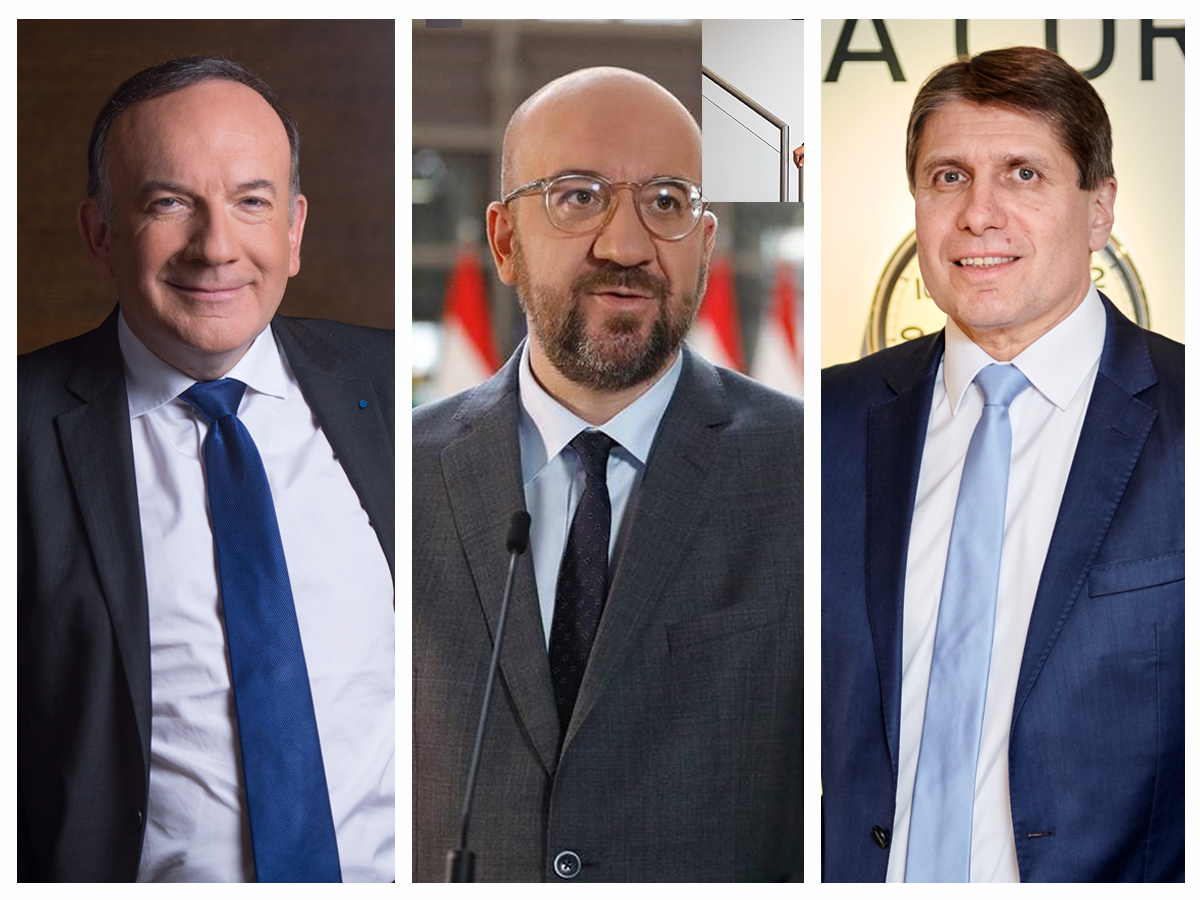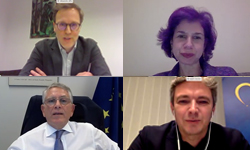BusinessEurope Headlines No. 2020-39
Meeting with Charles Michel: urgent need to finalise agreement on European recovery package
In a video conference meeting with European Council President Charles Michel on 23 November, BusinessEurope President Pierre Gattaz stressed the urgent need to finalise the agreement on the European recovery fund and the 2021-2027 Multiannual Financial Framework (MFF). He highlighted that this is essential to help the EU economy recover from the damage the COVID crisis continues to inflict. European enterprises and workers urgently need the EU financial support foreseen in this agreement. “It is the time to deliver the compromises found for the common good of all Member States”, said Gattaz.
Director General Markus J Beyrer, who also took part in the meeting, added that business fully agrees that the Green Deal is a key pillar of the European recovery plan but our climate ambitions will need to be embedded in a strong business plan, a plan that preserves European competitiveness and avoids carbon leakage to other world regions. “We count on the European Council to ensure that the Green Deal and the new targets are underpinned with a credible industrial strategy, paying more attention to how to fulfil Europe’s climate ambitions in the aftermath to the COVID crisis”, stated Beyrer.
Contact: Jasmin Ploner
Making the best use of EU free trade agreements
Although the EU has the largest network of preferential trading partners in the world, companies do not always use the business opportunities that our trade agreements create. Watch this video to know how free-trade agreements can be better implemented.
Demographic change: longer working lives and pension systems reforms needed
 What are the EU policy responses related to demographic change? This was the key question for discussion at the European Social Partners' meeting on 24 November. The meeting on demographic change was the last one from the series of discussions on improving performance of labour markets and social systems, both through national reforms and the European Semester. Experts from the European Commission, the Organisation for Economic Co-operation and Development and the Portuguese government reflected with EU and national social partners on how to ensure that people are willing and able to work longer and how pension systems need to be reformed to be adequate and sustainable. Increasing female employment participation is of particular importance to offset the shrinking working age population in the coming decades. Re-skilling and up-skilling the workforce is another part of the solution to increase the productivity of work at all ages, thereby improving the financial sustainability of social protection systems. Social partners have a key role at the national level to directly contribute to fiscally sound pensions reforms, and/or bring their views to governments on how to create a pension-friendly legal environment.
What are the EU policy responses related to demographic change? This was the key question for discussion at the European Social Partners' meeting on 24 November. The meeting on demographic change was the last one from the series of discussions on improving performance of labour markets and social systems, both through national reforms and the European Semester. Experts from the European Commission, the Organisation for Economic Co-operation and Development and the Portuguese government reflected with EU and national social partners on how to ensure that people are willing and able to work longer and how pension systems need to be reformed to be adequate and sustainable. Increasing female employment participation is of particular importance to offset the shrinking working age population in the coming decades. Re-skilling and up-skilling the workforce is another part of the solution to increase the productivity of work at all ages, thereby improving the financial sustainability of social protection systems. Social partners have a key role at the national level to directly contribute to fiscally sound pensions reforms, and/or bring their views to governments on how to create a pension-friendly legal environment.
Contact: Anna Kwiatkiewicz-Mory
Carbon border adjustment mechanism discussed at Trade and Climate Apéro
 On 24 November the last edition of BusinessEurope’s Trade and Climate online Apéro events had the pleasure to host Gerassimos Thomas, Director General of European Commission’s Directorate-General for Taxation and Customs Union (DG TAXUD), and the Member of the European Parliament Adam Jarubas (EPP). The discussion focused on the EU’s unilateral policy agenda, including the adoption of a carbon border adjustment mechanism (CBAM). A CBAM tool must be WTO-compliant to avoid retaliation from trading partners and must hence be designed as a purely environmental measure. Business representatives therefore stressed the importance of maintaining existing carbon leakage measures, like the free allowances in the EU emissions trading system (EU ETS), to effectively protect companies’ competitiveness. This series of events was a follow up on BusinessEurope’s position paper “What trade can do for climate”, published in June 2020.
On 24 November the last edition of BusinessEurope’s Trade and Climate online Apéro events had the pleasure to host Gerassimos Thomas, Director General of European Commission’s Directorate-General for Taxation and Customs Union (DG TAXUD), and the Member of the European Parliament Adam Jarubas (EPP). The discussion focused on the EU’s unilateral policy agenda, including the adoption of a carbon border adjustment mechanism (CBAM). A CBAM tool must be WTO-compliant to avoid retaliation from trading partners and must hence be designed as a purely environmental measure. Business representatives therefore stressed the importance of maintaining existing carbon leakage measures, like the free allowances in the EU emissions trading system (EU ETS), to effectively protect companies’ competitiveness. This series of events was a follow up on BusinessEurope’s position paper “What trade can do for climate”, published in June 2020.
![]() Contact: Jasmin Ploner
Contact: Jasmin Ploner
Maximising the impact of research and innovation to society
 “Research and Innovation (R&I) is crucial for shaping a better European future, where success depends on the conversion of knowledge into innovation, creating market and society impact”, highlighted BusinessEurope’s Deputy Director General, Alexandre Affre, at the RTO Innovation Summit "Industrial Technologies for the Future” on 19 November. Affre stressed that R&I has little value to society unless inventions are translated into innovations with beneficial impacts for citizens, and companies are the key drivers of this translation. “The future industrial strategy should mobilise the necessary investments for the EU to become climate-neutral in a cost-effective way, support the digital transformation of our economies and societies, restore all Single Market freedoms of movement to pre-COVID conditions urgently and set out an ambitious trade agenda that promotes new trade and investment opportunities for our companies”, he suggested.
“Research and Innovation (R&I) is crucial for shaping a better European future, where success depends on the conversion of knowledge into innovation, creating market and society impact”, highlighted BusinessEurope’s Deputy Director General, Alexandre Affre, at the RTO Innovation Summit "Industrial Technologies for the Future” on 19 November. Affre stressed that R&I has little value to society unless inventions are translated into innovations with beneficial impacts for citizens, and companies are the key drivers of this translation. “The future industrial strategy should mobilise the necessary investments for the EU to become climate-neutral in a cost-effective way, support the digital transformation of our economies and societies, restore all Single Market freedoms of movement to pre-COVID conditions urgently and set out an ambitious trade agenda that promotes new trade and investment opportunities for our companies”, he suggested.
Contact: Carolina Vigo
Discussion on Pandemic Insurance with the European Commission
 BusinessEurope participated in the 23 November European Commission roundtable with stakeholders and international organisations on Pandemic Insurance to assess the magnitude of the pandemic-related losses and issues related to the lack of pandemic protection in the EU. The BusinessEurope Economic Outlook expects the EU economy to fall by 7.3% in 2020 as a result of the COVID-19 epidemic and associated lockdowns. The economic impact of the crisis is divergent across both sectors and geographically which is also relevant for discussions on how to address the protection gap.
BusinessEurope participated in the 23 November European Commission roundtable with stakeholders and international organisations on Pandemic Insurance to assess the magnitude of the pandemic-related losses and issues related to the lack of pandemic protection in the EU. The BusinessEurope Economic Outlook expects the EU economy to fall by 7.3% in 2020 as a result of the COVID-19 epidemic and associated lockdowns. The economic impact of the crisis is divergent across both sectors and geographically which is also relevant for discussions on how to address the protection gap.
Contact: Erik Berggren
Calendar 
- 3 December: Webinar on the implementation of EU free-trade agreements (FTAs)
- 10 December: Mobility of professionals between the EU and Canada
- 22-25 February: EU Industry Week 2021
Not yet a subscriber? Register here.
Reminder: please have a look at our privacy policy